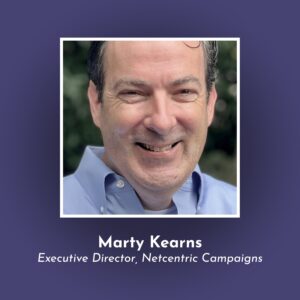
Ep 41 | Marty Kearns
Marty Kearns: “Building Networks in Uncertain Times”
On this episode, Nate is joined by Marty Kearns, a civic organizer and networking specialist. He and Marty discuss why both networks and communities will be critical to the coming challenges we face. How will the social ties we form now influence the outcome of power, peace and new social organization? How can we organize ourselves in order to best meet the future that is coming?
About Marty Kearns
Marty Kearns is the Executive Director of Netcentric Campaigns, leading product design, project oversight, evaluation, development of advocacy network theory and strategic business planning. Prior to that Marty developed communication tools with Green Media Toolshed to help environmental activists. He has also created and organized numerous mass volunteer projects from data collection to wildlife preservation.
In French, we have a motto that says that a simple drawing is often better than a long explanation. Jean-Marc Jancovici Carbone 4 President
That’s very understandable because with left atmosphere thinking, one of the problems is that you see everything as a series of problems that must have solutions. Iain McGilchrist Neuroscientist and Philosopher
We can’t have hundreds and hundreds of real relationships that are healthy because that requires time and effort and full attention and awareness of being in real relationship and conversation with the other human. Nate Hagens Director of ISEOF
This is the crux of the whole problem. Individual parts of nature are more valuable than the biocomplexity of nature. Thomas Crowther Founder Restor
Show Notes & Links to Learn More
Download transcript00:34 – Marty Kearns info + works
03:52 – Network vs Community
07:59 – Georgia River Network
08:25 – Rand, Networks and Netwars, Valdis Krebs
08:59 – Marguerite Casey Foundation
10:39 – Maslow’s hierarchy
11:43 – War Crimes in DRC
12:02 – Collapse in cigarette sales when cell phones hit the market
13:32 – TGS episodes with Daniel Schmachtengerger 1 + 2 + 3, Aza Raskin
15:48 – Is Gen Z more prone to technology/social media addiction? Yes and No
16:58 – Dunbar’s number
20:12 – Wicked problem
21:55 – Fracking
22:09 – Fracking ban in New York
22:18 – Halt the Harm
37:45 – Happiness in the Global North vs the Global South
38:08 – Social Capital in materially poor regions
41:00 – Humans are getting shorter
42:40 – Happiness and increased income are not completely correlated
47:40 – Statehood in DC
54:05 – Social connection is a basic need
58:25 – Free field guide for network managers
59:55 – Voter technology reducing voter suppression
1:06:50 – Grandma’s Hands Program in Philadelphia
1:07:31 – Program where wise people offer advice to young people
1:08:04 – Seeing altruistic acts makes people more likely to be altruistic themselves
1:08:34 – Some Good News
1:09:20 – Traffic jams are a mass dynamic that is not well understood
1:11:06 – Foot binding
1:11:15 – The invention of human rights
1:11:20 – The Evolution of International Human Rights: Visions Seen
1:13:08 – UK repealing ban on fracking
1:16:02 – Montgomery Bus Boycott during civil rights movements







